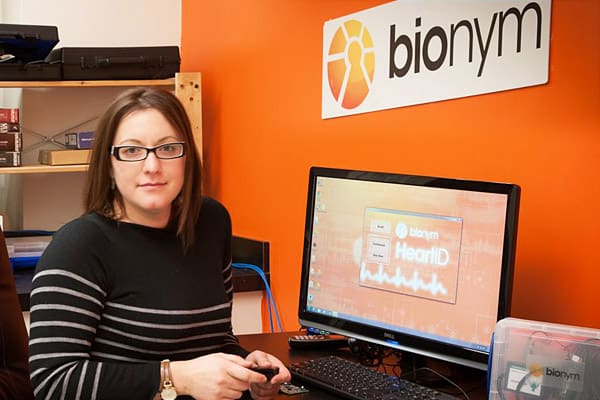
Bionym co-founder Foetini AgrafiotiSteve Jobs once famously expressed a desire that people fall in love with their iPhones. You may not be ready to fully commit to Apple’s advances, but logging into its devices might still require a very real piece of your actual heart sometime in the very near future.
A Toronto-based start-up called Bionym, comprised of graduates of the Electrical and Computer Engineering program at the University of Toronto, has developed a product called HeartID, which it has described as “the only commercially available biometric authentication solution that uses the cardiac signal.”
The futuristic solution to one of everyday’s most frustrating routines has some clear advantages. Retina scanning or face recognition software need purposeful stillness for the duration of the authentication process, which seems like something we’ll look back on one day as the equivalent of people having to sit for a minute and a half for photographic portraits. The wait, however, has been a necessity; the slightest movement creates a blur in the user’s features.
Fingerprint scanning needs the user’s intention. Heartbeat recognition boasts the same rate of accuracy (99%), and needs only the user’s unintentional touch. The user may eventually forget there even was a process of authentication, using technology without a thought for security. But the security is there.
Bionym says the offbeat (pun intended) solution will work on a commercial scale because every individual heartbeat is a unique identifier, special like snowflakes and impossible to replicate. Of the possible pathways to biometric recognition through devices (fingerprints, palm-vein prints, voice recognition, repetitive keyboarding, etc.), the heartbeat certainly would seem to beat all for security purposes (especially if you’re at all paranoid about someone cutting off your finger to gain access to your information).
With one of the most-often repeated tech news items of the past year being that passwords are at worst useless and at best obsolete, it seems inevitable that the race to win the biometric authentication prize will be won by the competitor with the most heart, er…strongest cardiac signal.
Bionym has demonstrated the technology at various security oriented trade shows throughout 2012, and hopes to begin licensing it to manufacturers of tablets, cell phones, firearms, and automobiles in the near future.
________________
Leave a Reply
You must be logged in to post a comment.



 Share
Share Tweet
Tweet Share
Share




Comment